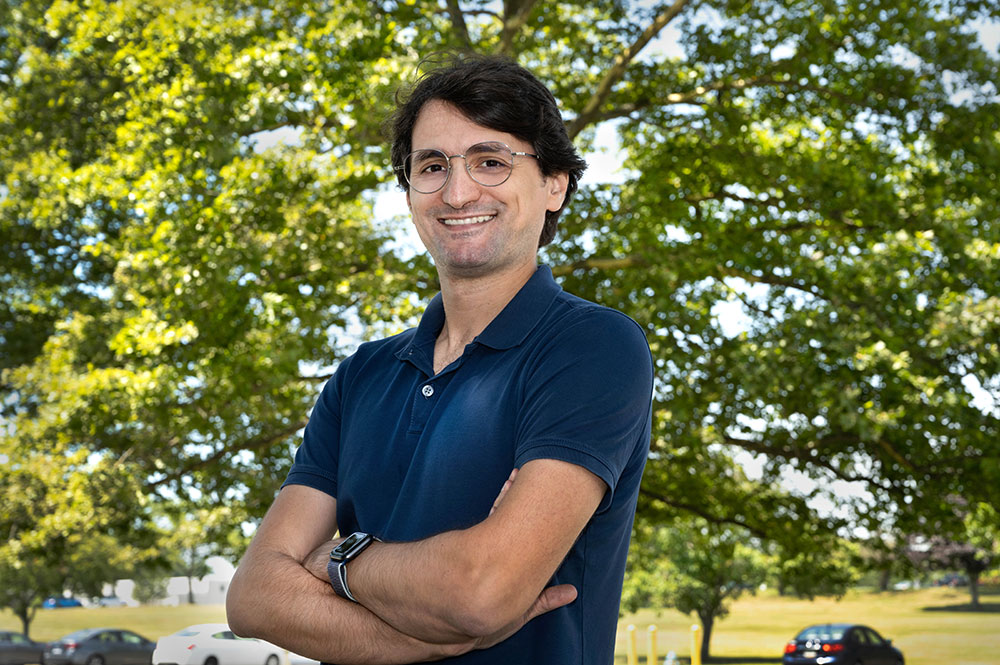531st Brookhaven Lecture: Probing the Quark-Gluon Plasma
December 13, 2022
In 2005—some 13.8 billion years after the Big Bang—scientists discovered the "perfect liquid" that filled the early universe during its first few microseconds. Scientists were surprised that this quark-gluon plasma (QGP) was not a gas, but a freely flowing liquid. Different mixtures have different boiling points but, for quick context, water transitions from a liquid to steam, a gas, at just 212 degrees Fahrenheit. The quark-gluon plasma was in liquid form while measuring approximately 7 trillion degrees Fahrenheit.
The scientists who discovered the quark-gluon plasma did it by smashing together beams of gold ions at the Relativistic Heavy Ion Collider (RHIC), a U.S. Department of Energy (DOE) Office of Science User Facility at the DOE's Brookhaven National Laboratory.
Learning more about this soup of subatomic particles is essential to understanding why visible matter—nearly everything we see in all the universe—behaves the way it does.
On Wednesday, Dec. 14, join physicist Yacine Mehtar-Tani of Brookhaven Lab's Physics Department for the 531st Brookhaven Lecture. His talk, titled "Probing the Hottest Matter Known: The Quark-Gluon Plasma" will be held at 4 p.m. on Zoom.
During this Brookhaven Lecture, Mehtar-Tani will open with an overview on the quark-gluon plasma and jets, which are energetic sprays of particles that are also produced in particle collisions. Jets lose substantial amounts of energy as they make their way through quark-gluon plasma, a process called "jet quenching." Mehtar-Tani will then explain how the study of jet quenching in heavy ion collisions provides insights into the quark-gluon plasma's dynamic properties. He will also discuss new phenomena associated with energy loss in hot quark-gluon matter, which could be probed at the future sPHENIX experiment at Brookhaven Lab.
About the Speaker
Mehtar-Tani is a physicist at Brookhaven Lab and a Fellow of the RIKEN BNL Research Center (RBRC). The RBRC is a physics research center located at Brookhaven Lab, formed by an international collaboration between the Laboratory and RIKEN—Japan's Institute of Physical and Chemical Research. Mehtar-Tani joined Brookhaven as an associate scientist in 2018 and was promoted to scientist in 2020.
Before Brookhaven, he was a research assistant professor and Fellow at the Institute for Nuclear Theory, University of Washington, from 2014 to 2018.
Mehtar-Tani earned his Ph.D. from the University of Paris in 2006. He went on to do postdocs at several institutions in Europe, including the Institut de Physique Théorique in France, Santiago de Compostela's Department of Particle Physics in Spain, the Institute for Theoretical Physics in Germany, and European Centre for Theoretical Studies in Nuclear Physics and Related Areas (ECT*) in Italy.
Mehtar-Tani earned his master's degree from Ecole Normale Supérieure in France in 2003. He earned a bachelor's of science from the University of Tlemcen in Algeria in 2002.
Brookhaven National Laboratory is supported by the Office of Science of the U.S. Department of Energy. The Office of Science is the single largest supporter of basic research in the physical sciences in the United States and is working to address some of the most pressing challenges of our time. For more information, please visit science.energy.gov.
Follow @BrookhavenLab on Twitter or find us on Facebook.
2022-20994 | INT/EXT | Newsroom










